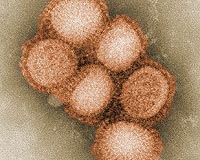| . |  |
. |
Washington (AFP) June 23, 2009 A US company that on Tuesday was awarded a 35-million-dollar contract to develop an influenza vaccine using insect cell technology has produced a first batch against (A)H1N1 flu, company boss Dan Adams said. "We turned out our first batch of doses -- about 100,000 -- against (A)H1N1 flu last week and we're continuing to manufacture it," Adams, chief executive officer of Connecticut-based Protein Sciences Corporation, told AFP. The US Department of Health and Human Services on Tuesday announced that it has awarded a 35-million-dollar contract to Protein Sciences, which could be extended for another five years to reach 147 million dollars. The insect cell technology "has advanced in recent years to a point that we believe it could help meet a surge in demand for US-based vaccine for seasonal and pandemic flu," Health Secretary Kathleen Sebelius said in a statement. A(H1N1), or swine flu, which emerged in Mexico in April, has been declared a pandemic by the World Health Organization, killing 231 people worldwide and infecting more than 52,000 people in 100 countries. As the novel strain of swine flu spread, scientists around the world scrambled to develop a seed strain, a necessary first step in developing a vaccine using either chicken eggs or mammalian cells -- the way most vaccines are produced. They warned that the virus could mutate during the southern hemisphere's flu season before returning north in a more lethal form in autumn, in a pattern similar to that seen in the deadly 1918 flu pandemic, which claimed an estimated 20 to 50 million lives around the globe. Protein Sciences makes flu vaccine by infecting caterpillar cells with a baculovirus carrying the gene for hemagluttinin, a molecule that sticks out of the surface of the influenza virus. "Using this method, vaccine candidates, clinical investigational lots, and commercial-scale vaccine production may be available faster than by using traditional vaccine production methods," the health department said in a statement. The method does not need a seed strain to develop a vaccine, Adams said. "While everyone else was waiting to get a seed strain, we worked with the genetic code from the virus," said Adams. "The CDC (Centers for Disease Control and Prevention) sent us a dead virus, which is perfectly safe, and then we extracted genetic information from that virus. "We can be in manufacturing a lot, lot quicker than people who have to wait for a seed strain," he said. Protein Sciences' technology is also safer "because these caterpillars don't have any association with man or other animals, so there's no chance for their cells to learn how to propagate human viruses," Adams told AFP. Under the terms of the grant made to Protein Sciences, if the company's new insect-cell technology proves to be safe and effective, the pharmaceutical minnow, which has just 50 employees, must boost its US manufacturing capability "to provide a finished vaccine within 12 weeks of pandemic onset." It would also have to produce at least 50 million doses of flu vaccine "within six months of pandemic onset." That should not be a problem, said Adams, because manufacturing a vaccine using insect cells can be easily and rapidly scaled up because it does not require the same specialized factories required to produce vaccine using egg or mammalian cells. "We can manufacture our product facilities that make monoclonal antibodies, which is a huge class of products with a huge manufacturing capacity around the world," said Adams. Protein Sciences' new vaccine against swine flu "could be available right away" if the Food and Drug Administration (FDA) issues an emergency use authorization for it, as it did for the bird flu vaccine developed by Adams's company. Swiss drugs giant Novartis, which the US government gave 289 million dollars to help develop a vaccine against (A)H1N1 flu, said around two weeks ago that it was poised to begin pre-clinical trials -- tests in vitro and on animals -- on its first batch of novel swine flu vaccine. Sanofi-Pasteur of France has said it hopes to have doses of swine flu vaccine ready for clinical trials within weeks, while Taiwan's Adimmune Corporation said it expects to complete clinical trials on its A(H1N1) influenza vaccine around September.
Share This Article With Planet Earth
Related Links Epidemics on Earth - Bird Flu, HIV/AIDS, Ebola
 Swine flu tolls leaps past 52,000 cases
Swine flu tolls leaps past 52,000 casesGeneva (AFP) June 22, 2009 The World Health Organisation on Monday reported a huge leap in the swine flu pandemic toll to more than 52,000 people infected and 231 dead. The toll has risen by more than 7,873 cases and 51 deaths since Friday, highlighting the steady spread of the A(H1N1) virus. Swine flu has now been reported in 100 countries and territories. And figures yet to be incorporated into the UN health ... read more |
|
| The content herein, unless otherwise known to be public domain, are Copyright 1995-2009 - SpaceDaily. AFP and UPI Wire Stories are copyright Agence France-Presse and United Press International. ESA Portal Reports are copyright European Space Agency. All NASA sourced material is public domain. Additional copyrights may apply in whole or part to other bona fide parties. Advertising does not imply endorsement,agreement or approval of any opinions, statements or information provided by SpaceDaily on any Web page published or hosted by SpaceDaily. Privacy Statement |